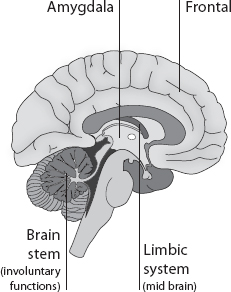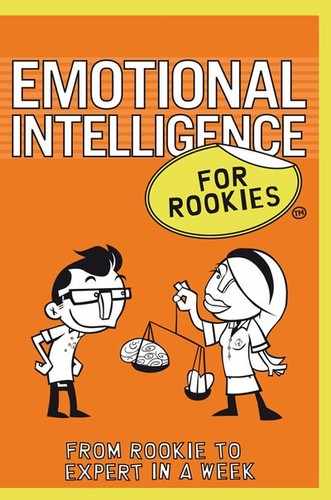CHAPTER 1
Bringing emotional
intelligence to life –
through your mind
What is emotional intelligence?
What makes someone stand out? As the thoughts that you have written down will show, it’s not just one thing, but a combination of personal attributes. In fact, it’s emotional intelligence.
Many people think emotional intelligence is soft and fluffy, and if it had a colour they would probably say it was pink! Right now, you might feel the same, but since you are reading Emotional Intelligence for Rookies, you are probably ready to explore the concept and look at how to practically apply your own emotional intelligence.
The fact is, everyone is emotionally intelligent to some degree, but whether you choose to act with emotional intelligence depends on whether you believe in and value your feelings; and on whether you understand the impact emotional intelligence has in your life today.
This chapter highlights the essence of emotional intelligence and draws together the many strands associated with its definition. It explores “intrapersonal” and “interpersonal” intelligences and gives a basic explanation of how the emotional brain works in harmony with the cognitive brain.
Through illustrating some of the challenges of today’s dynamic environment, you will realize that emotional intelligence is neither soft nor fluffy and most definitely is not pink. You will recognize that acting with emotional intelligence is the way to enhance your personal performance and to succeed when working with others.
 Rookie Buster
Rookie Buster
Acting with emotional intelligence is the way to enhance your personal performance and to succeed when working with others.
To help explain and remove some of the myths associated with EI, there is a need to accept that emotional intelligence is not one thing. It is about understanding emotions, impulses and drivers, and intelligently handling these to enhance performance and relationships.
Your ability to act with emotional intelligence depends on your level of emotional maturity. Maturity comes from wisdom gained through experience, combined with an increased understanding of yourself and an insight into how you may interact with others.
This knowledge, gained on your personal journey through life, explains why your emotional intelligence increases with age and experience.
 Rookie Buster
Rookie Buster
Your emotional intelligence increases with age and experience.
In 1990, Peter Salovey and Jack Meyer were the first to adopt the term “emotional intelligence” to describe the way people bring “intelligence” to their emotions. Since then, many others, such as Dr Daniel Goleman (in the USA) and Professors Malcolm Higgs and Victor Dulewicz (in the UK) have offered a definition for emotional intelligence. These are best summarized as follows.
Emotional intelligence is about being able to:
• Recognize your own feelings and those of others.
• Lift your mood and motivate yourself.
• Manage your emotions internally and in your relationships with others.
Self and relationship management
From the summary definition, you can see that the first aspect of emotional intelligence is related to your ability to manage yourself. To do this you need to have a strong sense of self-awareness, a belief in yourself and firm self-control.
The second aspect of emotional intelligence is related to your ability to manage your relationships with others. For this you need to really understand the feelings and responses of others and build on this understanding to form strong and lasting relationships.
To help you to develop self and relationship management, you’ll need to tap into your “intrapersonal” and “interpersonal” intelligences.
These are just two of your multiple intelligences, researched by Howard Gardner, Harvard Professor of Education Emeritus, and discussed in his book Frames of Mind.
Intrapersonal intelligence
Through using your intrapersonal intelligence (or self-knowledge), you can identify what is going on inside you, and consider what you need to do. Intrapersonal intelligence helps to make sense of the things you do, the thoughts you have and the feelings you feel. With intrapersonal intelligence you can begin to take control of yourself and your emotions.
 Rookie Buster
Rookie Buster
With intrapersonal intelligence you can begin to take control of yourself and your emotions.
Interpersonal intelligence
Through your interpersonal intelligence (or knowledge of dealing with other people), you can be intelligent in identifying what other people are feeling and also the feelings between others. You can therefore make intelligent decisions about what you need to do about that. It can help you to stay in tune with others, empathize, communicate and influence. With interpersonal intelligence you can inspire others and develop trust.
 Rookie Buster
Rookie Buster
With interpersonal intelligence you can inspire others and develop trust.
Cognitive versus emotional intelligence
Historically, human intelligence has been based on cognitive intelligence, and from the early twentieth century onwards intelligence quotient, or IQ, tests have been available to measure cognitive ability and intellect. With school systems around the world geared towards valuing and developing the logical-mathematical and linguistic capabilities, IQ alone was widely believed to be the best predictor of success.
However, over more recent years, research by a number of psychologists has led to the belief that there are a number of qualities other than IQ that determine success. These capabilities largely relate to the ability to get on with other people, and can be defined as emotional intelligence.
In 1996, Dr Daniel Goleman brought the concept of emotional intelligence to the attention of the world when he published his first book Emotional Intelligence – Why It Can Matter More Than IQ. His book became a bestseller as people showed their willingness to accept that IQ on its own was not a reliable predictor of success in most areas of life.
Goleman partly supported his case for EI being “an important predictor of managerial performance” by studying the physiological basis of EI. However, his strongest belief in the supremacy of EI over IQ and technical capability came from a study in 1998 that analysed competency models from 188 global businesses.
Since that time, other psychologists have collected evidence to support a relationship between emotional intelligence, career progression and performance. It is now widely accepted that EI is twice as important as IQ and technical skills in determining job success.

 Rookie Buster
Rookie Buster
EI is twice as important as IQ and technical skills in determining job success.
Understanding how the brain functions
Today, through the work of many neurologists and psychologists, much more is understood about the workings of the brain and its interconnections with the bodily systems. While there is still much more that is likely to be revealed in years to come, this book sets out the knowledge that is widely accepted today.
The brain is divided into three distinct areas: frontal, mid and stem. The frontal and mid sections are connected by neural pathways, which allow the cognitive and emotional brains to work together to identify and manage responses to situations. The brain stem is responsible for basic bodily functions, which we do not need to consider here.
Frontal brain
The neo-cortex sits at the top of the brain, above the cortex. “Neo”, meaning new, defines this area of the cognitive brain that is unique to humans and has evolved over many centuries, since man first needed to plan, organize and interact with others.
Today the neo-cortex is a very sophisticated machine that governs analytical and technical ability. It is a highly efficient learning area that grasps concepts quickly and expands understanding by linking new ideas or facts.

Mid brain
This is the site of the emotional brain: the amygdala and the limbic system that governs feelings, impulses and drives.
Skills learned here are embedded through motivation, extended practice and feedback. Many of the techniques within this book are focused on this emotional centre. Learning in this area of the brain is generally slower than in the cognitive brain, as it involves re-educating the emotional brain and sometimes involves changing deeply ingrained habits. However, because this learning is practised and repeated over time, it is much more likely to be retained and remembered for many years.
 Rookie Buster
Rookie Buster
Because this learning is practised and repeated over time, it is much more likely to be retained and remembered for many years.
Cognitive and emotional brain working in harmony
The fact that the cognitive brain is used to make sense of things often leads to the misconception that it is more powerful than the emotional brain. However, research has shown that it is our emotional brain and limbic system that is the real powerhouse.
While learning may be slower in the emotional brain, the limbic system is constantly gathering information and has the ability to process vast quantities of data – 6 billion bits per second, compared with the cognitive mind that processes just 10–100 bits per second.
 Rookie Buster
Rookie Buster
The limbic system is constantly gathering information and has the ability to process vast quantities of data – 6 billion bits per second.
This capacity for collecting and assessing large amounts of information is highly significant. It allows the emotional brain to constantly communicate with all the bodily systems, sensing what is going on and continuously checking new information against stored data, and updating accordingly.
Let’s take a simple example to illustrate the importance of this powerhouse. Imagine that you are having a conversation with an important client. Your cognitive centre is working hard, listening to the concept that the client is sharing with you, interpreting the facts, questioning, probing and creating ideas to enable you to respond.
While this is happening your emotional brain is equally busy, collecting and interpreting information from your key sensory systems (eyes, ears, touch, mouth, nose), as well as communicating with your internal systems (heart, gut, lungs, nerves, endocrine and immune).
Your emotional brain is reading your client’s face, listening to the tone and rhythm of their voice and tuning in to how they are feeling as you converse. The messages your emotional brain is receiving may range from “He liked that,” to “Now he’s bored,” or “He doesn’t agree.”

Your emotional brain is also interpreting your bodily transmissions – the pressure wave from your gut is getting stronger, your heart rate is increasing, your blood is rushing to your face.
Interpreting all this at high speed, your emotional brain is able to feed your cognitive brain, allowing you to make changes to your style and to fine tune what you say next.
Using your intrapersonal and interpersonal
intelligences to take control
Now you have an understanding of the basic functioning of your brain and the role that the emotional centre has in providing crucial data and information to the thinking brain. You can now begin to see the importance of how you must manage your intrapersonal and interpersonal intelligence.
Most of the time you will not be conscious of the intelligence gathered by your senses from external sources, or gathered by the limbic system from your internal sources. However, this is happening second by second and could, if recognized, provide you with a wealth of data on which to base your decisions, your judgements and your responses.
By bringing a conscious awareness to this emotional data, you can start to use this information more practically and take control of how you feel, think and act.
Why is emotional intelligence important?
Emotional intelligence is primarily about managing yourself well and enhancing your relationships with others in order to be happier, healthier and more successful. This concept is not new, and neither is the concept of emotional intelligence. It’s a fact that human beings strive to achieve happiness, stay healthy and attain personal success, relative to their environment.
 Rookie Buster
Rookie Buster
Emotional intelligence is primarily about managing yourself well and enhancing your relationships with others in order to be happier, healthier and more successful.
So what has brought emotional intelligence to the forefront in recent years, and why is it important to recognize and use the power of emotional intelligence today?
Let’s take a look at some of the challenges that drive the need for greater emotional intelligence today. Consider these in terms of self and relationship management.
Self-management
A changing world
Uncertainty and turbulence is nothing new. For nearly thirty years industrialized countries have seen the pace of change increasing and the pressures mounting, as technology and communications have developed and enhanced.
Individuals have faced continual uncertainty as organizations change size and shape, expand into new geographical markets and introduce new methodologies and technologies to replace tried and tested practices.
This period of evolution has been and is extremely dynamic, and the future will be the same.
Economic drivers have also changed, moving from transactional (what you do), to knowledge based (what you know). Today the economy is driven by relationships and how you relate to others.
 Rookie Buster
Rookie Buster
Today the economy is driven by relationships and how you relate to others.
Consequently, individuals require higher levels of self-awareness, self-belief, self-control and self-motivation to cope with and accept continual change, respond flexibly and manage their anxieties and stress. They also need to develop a deep understanding of how to effectively relate and successfully interact with others.
Sophisticated technology
With significant advances in technology, there is less need to work from a dedicated office, or use wires to connect to information systems; access to data and knowledge is available from wherever you work, whether it be at a home office, a train station or a hotel foyer; 24/7, worldwide!
But advances bring new challenges: the speed of communication, the availability and volume of information, heightened expectations in terms of response times or decision making, and increased pressure to stay ahead of the competition.
Such challenges increase the need for individuals to manage themselves effectively, heightening the need for self-awareness, intuitiveness and conscientiousness.
Organizational structure
As organizational structures have flattened, individuals have seen their remits broaden and their levels of responsibility increase. With no hierarchical structure, individuals are often working without direction, reporting to line managers who have no relevant knowledge and who could be physically located elsewhere or working in a different time zone.
Individuals may feel daunted, isolated and overloaded by this new business environment. With limited personal training and lack of leadership training they may find it difficult to cope with the pressures, becoming overwhelmed and often ill.
If you are working in this type of environment, you need to be acutely self-aware and to develop high levels of emotional resilience.
 Rookie Buster
Rookie Buster
You need to be acutely self-aware and to develop high levels of emotional resilience.
Relationship management
Understanding and retaining clients
Clients and customers are faced with an extraordinary plethora of choice and have unlimited access to information. Consequently their expectations have heightened, their requirements have become more sophisticated, and they are clearly more savvy when it comes to negotiating the best deal.
These factors mean that it is more important than ever to develop client relationships through openness, honesty and trust. They emphasize the need to create mutual respect and embrace a collaborative approach.
In theory this sounds simple, but in practice it can only be achieved with genuine interpersonal skills, by being attuned to the non-verbalized needs of the clients and being sensitive to one’s own words and actions.
 Rookie Buster
Rookie Buster
It is more important than ever to develop client relationships through openness, honesty and trust.
Working cross-culturally
Operating in a global environment, working cross-culturally and multi-functionally, creates a far greater dynamic and challenge for individuals and organizations today. Cultural style differences often don’t transcend borders, and difficulties arise when this is not understood.
Being emotionally intelligent creates an awareness and understanding that attunes individuals to the feelings, needs and styles of others. Even if there is no common language, much can be picked up through facial expressions, body language and inferences. Being able to tune in to these subtle changes is critical to creating rapport, getting people on side and working together successfully.
 Rookie Buster
Rookie Buster
Being emotionally intelligent creates an awareness and understanding that attunes individuals to the feelings, needs and styles of others.
Coach’s notes 
This chapter has explained the essence of emotional intelligence and how the brain captures and interprets this intelligence. It has highlighted why EI is so important in today’s dynamic environment, and sets out a framework for assessing and developing EI.
Before you take any steps to practically enhance your own emotional intelligence, it is worth remembering:
• Emotional intelligence is twice as important as IQ, and as you become more senior within an organization, your emotional intelligence becomes more important.
• Your emotional brain can and will override your cognitive brain if you are not “in tune” and “in control” of your emotions.
• To enhance your personal performance you need to recognize and control your emotions, drivers and impulses.
• To work with others and enhance results, you need to be attuned to their feelings and interpret the signals that you receive.
Go for it! Having got this far, you should now feel pleased that you have made sense of emotional intelligence in a rational, logical way by using your cognitive intelligence. Now it is time for you to turn to Chapter 2, tune in to your body and begin to have that mind/body conversation, so that you can feel, think and act in a more emotionally intelligent way.


Tuning in to your body may sound strange and may even make you feel uncomfortable at this point. Perhaps you have never really given much thought to the fact that on some days you feel positive and enthusiastic, and on other days quite apathetic and low.
As you move through this chapter, you will explore what is happening within your body and what is behind your feelings or your state of mind. You will start to understand what creates an emotion, the different types of feelings and the distinction between a feeling and a mood.
By the end of this chapter you will know what triggers emotion and how that emotion can affect you. You will realize that there is a constant dialogue going on internally between your body and your mind and recognize that you can be part of that dialogue if you “tune in”. By “tuning in” and trusting your feelings, you can really capitalize on what they are telling you and act in a more emotionally intelligent way.
